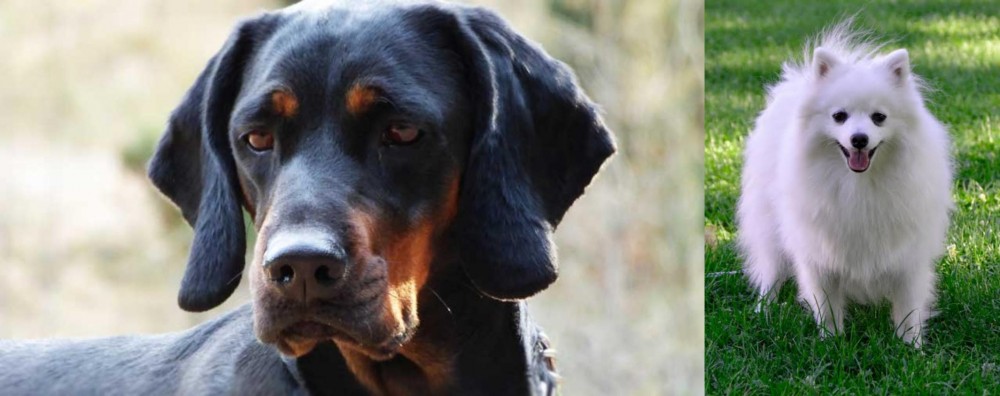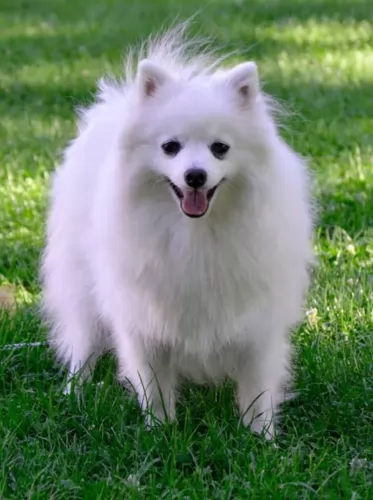 Petzlover
Petzlover Polish Hunting Dog is originated from Poland but Volpino Italiano is originated from Italy. Polish Hunting Dog may grow 36 cm / 15 inches higher than Volpino Italiano. Polish Hunting Dog may weigh 20 kg / 45 pounds more than Volpino Italiano. Polish Hunting Dog may live 3 years less than Volpino Italiano. Polish Hunting Dog may have more litter size than Volpino Italiano. Polish Hunting Dog requires Low Maintenance. But Volpino Italiano requires High Maintenance
Polish Hunting Dog is originated from Poland but Volpino Italiano is originated from Italy. Polish Hunting Dog may grow 36 cm / 15 inches higher than Volpino Italiano. Polish Hunting Dog may weigh 20 kg / 45 pounds more than Volpino Italiano. Polish Hunting Dog may live 3 years less than Volpino Italiano. Polish Hunting Dog may have more litter size than Volpino Italiano. Polish Hunting Dog requires Low Maintenance. But Volpino Italiano requires High Maintenance
 The Polish Hunting Dog originates from Poland and is a purebred scenthound. Hunting with scent hounds goes right back to the 13th century, being highly esteemed by Polish nobility.
The Polish Hunting Dog originates from Poland and is a purebred scenthound. Hunting with scent hounds goes right back to the 13th century, being highly esteemed by Polish nobility.
The famous Polish cynologist, Jozef Pawuslewicz hunted with Polish scent hounds and was part of the development of breeding this dog.
He wrote the first breed standard and the dog was officially registered by the Polish Cynological Association.
 This Italian bred dog is Spitz-type and very ancient. The Spitz breeds have been around since at least 4000BC. Archeologists have found remains that match the Spitz heritage of fox like heads, curly tails, erect small ears. In Greece in 400BC there were engravings of these dogs. Michelangelo painted the breed as he lived with one. In 1888, the Queen of England – Victoria – brought 6 back to England from Florence.
This Italian bred dog is Spitz-type and very ancient. The Spitz breeds have been around since at least 4000BC. Archeologists have found remains that match the Spitz heritage of fox like heads, curly tails, erect small ears. In Greece in 400BC there were engravings of these dogs. Michelangelo painted the breed as he lived with one. In 1888, the Queen of England – Victoria – brought 6 back to England from Florence.
The Italians have loved the Volpino for centuries. These little dogs that resemble the Pomeranian so much but existed much before them. It was very early in the history of the domesticated dog that the Volpino moved from north to south. The Italians called them Volpino because it means foxy dog. They also called them Lupino which means wolfy dog.
The breed was never seen outside of its home range in Italy until the 1880’s and it is still a rare breed. However since the 1980’s the breeders of the American Eskimo brought some from Italy to the US and claimed they were American Ekimo runts. They interbred the Volpino with the American Eskimo creating the toy and mini Eskimo.
The Volpino was a guard dog alerting the Mastiffs to the presence of intruders. The Mastiff would then respond to the intruder. The Volpino was also a popular companion animal due to their easy temperament and their high intelligence level. However they grew less popular and by 1965 there were only a few registered dogs left. There was an attempt to revive the breed in 1984 when dogs that still lived on farms were used as new stock. Even with this, they remain a rare breed and only about 4000 are alive throughout the world.
The Volpino have been denied AKC registration or stock registration as they are considered to be too much like the American Eskimo Dog. However they are recognized by the FCI, the UKC, the ENCI (Italian National Kennel Club), the North American Volpino Club, the Volpino Italiano Health and Genealogy Club and the Volpino Club of America.
 The Polish Hunting Dog is a large, strong dog standing between 50 – 66cm in height and weighing between 20 to 32kg. He is very similar to a Doberman Pinscher or a Rottweiler in looks.
The Polish Hunting Dog is a large, strong dog standing between 50 – 66cm in height and weighing between 20 to 32kg. He is very similar to a Doberman Pinscher or a Rottweiler in looks.
The dog’s coat is short and the color is usually black and tan. He is a deep chested dog with a well-proportioned head, with longish muzzle and floppy ears. The tail is long.
Well balanced and gentle, the Polish Hound is a courageous, intelligent dog, easy to train and socialize. It isn’t an aggressive dog but is wary of strangers.
He loves playing with children and is loving and kind to them. He never tires of their games. He is alert and protective and makes a great watchdog.
 The Volpino is about the same size as the Pomeranian and smaller than the American Eskimo Dog. They are a rare breed and they have a soft, thick coat and they can be red, white or champagne. With the pointed ears and muzzles, they do look like a fox. They have large thick tails curling over their back and they have double coats.
The Volpino is about the same size as the Pomeranian and smaller than the American Eskimo Dog. They are a rare breed and they have a soft, thick coat and they can be red, white or champagne. With the pointed ears and muzzles, they do look like a fox. They have large thick tails curling over their back and they have double coats.
 Your Polish Hunting Dog is a great choice of dog as a family pet. Used as a hunting dog he will be thrilled if he lands up with a family who are active and outdoorsy types.
Your Polish Hunting Dog is a great choice of dog as a family pet. Used as a hunting dog he will be thrilled if he lands up with a family who are active and outdoorsy types.
You can always count him in when it comes to going for walks, hiking, cycling or running next to you when you go horse-riding.
The Polish Hunting dog is a stable, gentle dog and he has a whole lot of other wonderful attributes to his name. He is loving, loyal, courageous, friendly, social and companionable. And he's good looking. What a great pet this low maintenance dog makes.
 They are generally a robust breed and can easily reach up to 14 years of age with good care. There are always some common dog illnesses that you can benefit from knowing about because then you can get your pet to the vet if he appears to be under the weather.
They are generally a robust breed and can easily reach up to 14 years of age with good care. There are always some common dog illnesses that you can benefit from knowing about because then you can get your pet to the vet if he appears to be under the weather.
Active dogs are always going to be exposed to parasites, whether they be ticks, fleas or worms. Right from word go, puppies are treated for worms, but it is important to treat your dog regularly for parasites. Speak to your vet about the best products.
Heatstroke is always a risk for dogs even in areas where the weather isn’t particularly hot. People think on overcast days they can leave their dog in the car while they go in to the shops. A temperature that seems mild to a human can be like an oven to a dog. Excess heat is deadly to a dog. Signs of heatstroke include drooling, panting, anxiety, collapsing and then death.
 The Italian Volpino has better health than most dogs due to so much isolation for so many years. However they are susceptible to some diseases and genetic issues.
The Italian Volpino has better health than most dogs due to so much isolation for so many years. However they are susceptible to some diseases and genetic issues.
• PLL Primary Lens Luxation – Genetic mutation of the eye. Very painful and usually occurs between 4 and 8 years of age. Usually results in euthanasia.
• Patellar Luxation – moving knee cap – can result in lameness and/or arthritis.
 The Polish Hunting Dog has always had an acute sense of smell, and with his long legs he has always been able to track his prey for many miles. This hunting has made him a dog that wants lots exercise and activities.
The Polish Hunting Dog has always had an acute sense of smell, and with his long legs he has always been able to track his prey for many miles. This hunting has made him a dog that wants lots exercise and activities.
As a pet, this dog will require a lot of exercise, being better suited to active, outdoor type of owners. He is therefore better suited to life in the country and large open spaces as opposed to living in the city.
Apart from brushing your pets coat twice a week, check him over for ticks if you want to avoid the spread of tick-borne diseases.
Check his ears, inside and out. Check inside his mouth for bad teeth. This is because your dog can’t tell you if he has pain, and toothache can be terrible for your pet and bad teeth can affect other body organs such as the heart and the kidneys.
Make sure your pets nails are trimmed.
Make sure your pet receives excellent food. If you’re going to be feeding your dog commercially manufactured dog food, make sure it is the best quality ones. Some of the other foods have ingredients in them which can cause your dog to get sick.
Try and give your dog some wholesome, home-made food. Boiled chicken, brown rice or pasta, carrots, sweet potato and spinach chopped up and added to the kibble will have your pet wagging his tail with delight. It will also be to his benefit to get some raw meat in from time to time.
Never leave your pet without a constant supply of fresh, cool water.